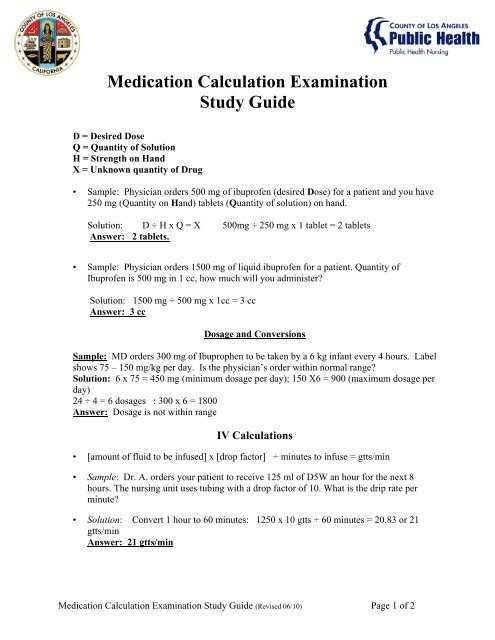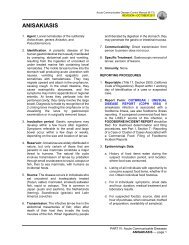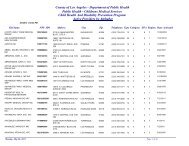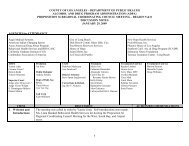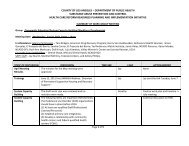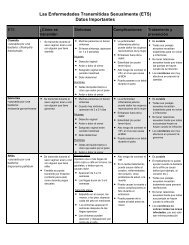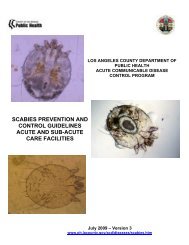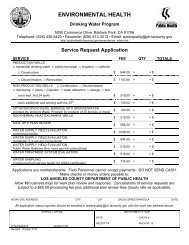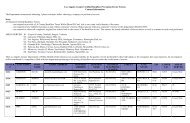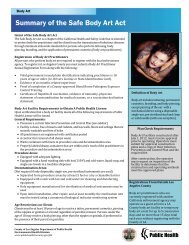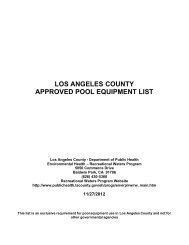Medication Calculation Examination Study Guide - Department of ...
Medication Calculation Examination Study Guide - Department of ...
Medication Calculation Examination Study Guide - Department of ...
Create successful ePaper yourself
Turn your PDF publications into a flip-book with our unique Google optimized e-Paper software.
<strong>Medication</strong> <strong>Calculation</strong> <strong>Examination</strong><br />
<strong>Study</strong> <strong>Guide</strong><br />
D = Desired Dose<br />
Q = Quantity <strong>of</strong> Solution<br />
H = Strength on Hand<br />
X = Unknown quantity <strong>of</strong> Drug<br />
• Sample: Physician orders 500 mg <strong>of</strong> ibupr<strong>of</strong>en (desired Dose) for a patient and you have<br />
250 mg (Quantity on Hand) tablets (Quantity <strong>of</strong> solution) on hand.<br />
Solution: D ÷ H x Q = X 500mg ÷ 250 mg x 1 tablet = 2 tablets<br />
Answer: 2 tablets.<br />
• Sample: Physician orders 1500 mg <strong>of</strong> liquid ibupr<strong>of</strong>en for a patient. Quantity <strong>of</strong><br />
Ibupr<strong>of</strong>en is 500 mg in 1 cc, how much will you administer?<br />
Solution: 1500 mg ÷ 500 mg x 1cc = 3 cc<br />
Answer: 3 cc<br />
Dosage and Conversions<br />
Sample: MD orders 300 mg <strong>of</strong> Ibuprophen to be taken by a 6 kg infant every 4 hours. Label<br />
shows 75 – 150 mg/kg per day. Is the physician’s order within normal range?<br />
Solution: 6 x 75 = 450 mg (minimum dosage per day); 150 X6 = 900 (maximum dosage per<br />
day)<br />
24 ÷ 4 = 6 dosages : 300 x 6 = 1800<br />
Answer: Dosage is not within range<br />
IV <strong>Calculation</strong>s<br />
• [amount <strong>of</strong> fluid to be infused] x [drop factor] ÷ minutes to infuse = gtts/min<br />
• Sample: Dr. A. orders your patient to receive 125 ml <strong>of</strong> D5W an hour for the next 8<br />
hours. The nursing unit uses tubing with a drop factor <strong>of</strong> 10. What is the drip rate per<br />
minute?<br />
• Solution: Convert 1 hour to 60 minutes: 1250 x 10 gtts ÷ 60 minutes = 20.83 or 21<br />
gtts/min<br />
Answer: 21 gtts/min<br />
<strong>Medication</strong> <strong>Calculation</strong> <strong>Examination</strong> <strong>Study</strong> <strong>Guide</strong> (Revised 06/10) Page 1 <strong>of</strong> 2
<strong>Medication</strong> <strong>Calculation</strong> <strong>Examination</strong><br />
<strong>Study</strong> <strong>Guide</strong><br />
• Sample: Dr. B. orders a liter <strong>of</strong> D5W to run this 8-hour shift. The drop factor is 15. What<br />
is the drip rate per minute?<br />
Solution: 1 liter = 1000 cc <strong>of</strong> solution, next convert 8 hours to minutes (8 X 60 minutes)<br />
= 480 minutes<br />
1000 cc x 15 gtts ÷ 480 minutes = 31.25 or 31 gtts/min<br />
Answer: 31 gtts/min<br />
• Your patient weighs 200 lb and the order is to infuse 250 mg dobutamine in 500 ml NS<br />
at 10 mcg/kg/min. How many milligrams <strong>of</strong> dobutamine will infuse per hour?<br />
200÷2.2= 90.90kg: 60 minutes = 1 hour:<br />
10 mcg x 90.90kg x 60 min=5454.54 mcg/hour ÷ 1000 = 54.54mg/hr or 54.5mg/hr<br />
Answer:_____54.5mg/hr_____<br />
The “7 Rights” <strong>of</strong> <strong>Medication</strong> Administration<br />
Right Patient Right Drug Right Dose Right Route<br />
Right Time Right Documentation Right to Refuse<br />
Conversion Table<br />
• 1 kilogram (kg) = 1000 grams (g)<br />
• 1 gram (g) = 1000 milligrams (mg)<br />
– Convert Grams to Milligrams by Multiplying grams by 1,000<br />
– Convert Milligrams to grams by dividing milligrams by 1,000<br />
• 1 milligram (mg) = 1000 micrograms (mcg)<br />
• Grains (gr.) 15 = 1 Gram (g) or 1000 milligrams (mg)<br />
– To convert g. to gr multiply by 15<br />
– To convert gr to g divide by 15.<br />
• 1 Grain (gr.) = 60 Milligrams (mg)<br />
– To convert gr. to mg multiply gr. by 60<br />
– To convert mg to gr. divide mg. by 60<br />
• 1ml = 1 cc<br />
• 1 ounce = 30 ml<br />
• 1 tablespoon (T or tbsp) = 15 ml<br />
• 1 teaspoon (t or tsp) = 5 ml<br />
• 2.2 lb = 1 kg<br />
• To convert pounds to kg divide pounds by 2.2<br />
• To convert kg to pounds multiply by 2.2<br />
<strong>Medication</strong> <strong>Calculation</strong> <strong>Examination</strong> <strong>Study</strong> <strong>Guide</strong> (Revised 06/10) Page 2 <strong>of</strong> 2


